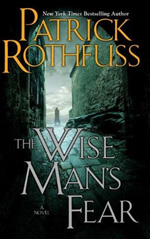
![]() verkisto
verkisto
7/26/2016
![]()
After I finished The Name of the Wind last year, I found a lot of reviews and comments complaining about Kvothe being a Mary Sue character. I sort of got it, but at the same time, I thought to myself that fantasy characters are all about wish fulfillment, so it makes sense that the main characters are really good at what they do. But now that I've finished The Wise Man's Fear, I get it. Kvothe isn't just the youngest person to ever attend University, or the only one to get his tuition paid for, or the youngest to earn his pipes, or the best ever to pick up a lute and play it (man, how is it that I didn't pick up on this with the first book?), but he's also the only outsider to ever receive training in some super-secret ninja clan, the only person EVAR to escape from Feleurian, and even manages to win a Lord's favor to cover his tuition at University for the rest of his time there, even after he offends the Lord's wife. So, yeah, the Mary Sue-ness of his character finally revealed itself to me. It was a little tiring, not just because Kvothe was so good at everything, but also because suddenly there was no real tension in the events of the story. We already had a slight removal of tension by having the novel narrated through flashback (i.e., we know the hero survives, so we don't have to worry about him dying), but his overall perfection at everything he does removes it further. Why should we worry over him when we know he's just going to be the best at what he does?
Story-wise, I got a little annoyed when it shifted to him being in the world of Faerie, since it seemed tacked on and, honestly, out of place. I get that this is a fantasy novel, but it felt like a fantasy novel where there are creatures of the night, systems of magic, and other fantastical elements, but it didn't feel like a "Oh, Faeries are in our midst!" fantasy novel. That part of the story was a left turn that, while interesting, didn't really fit in with everything else that was going on in the series. It was thrown in, it seemed, to show that Kvothe had one more aspect to his character that he would master, and that he was trained in the art of said aspect by the master of sex herself. That's an issue in and of itself, but outside of that was the fact that the entire sequence didn't seem to belong with all the rest.
Halfway through the novel, the story diverted from Kvothe being at University, and followed him as he had adventures outside of it. I didn't find it out of place (save for the Faerie bit), but I did wonder why this book wasn't broken down into two different volumes. The first half of the book feels complete, with conflicts that Kvothe has to overcome, and him finding his way to do so, as does the second half. Given that the book was over 1100 pages, I could see it having been broken apart and still being two complete stories. I mean, yes, 11/22/63 also had two fairly complete stories embedded within, but that was just a one-volume story; we already know that these books are part of a series, so why not break them apart and make them separate?
Despite those complaints, though, I still have to say that I really enjoyed the book. This is still a story well told, and Rothfuss paints the picture of the events very well. The constant tension between Kvothe and Denna was well done, especially near the end of the story. I think that would have been a perfect place to end the story, but then Rothfuss had to go and have one more "Oh, Kvothe, you're so perfect!" moment that reminded me too much of Twilight. I'm still looking forward to the end of the series, but I won't deny that I have a little more apprehension about it, now that I've picked up on him being a Mary Sue.